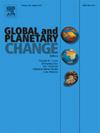Exploring the impact of the Great Green Wall on Atlantic Tropical Cyclone activity
IF 4
1区 地球科学
Q1 GEOGRAPHY, PHYSICAL
引用次数: 0
Abstract
The Great Green Wall (GGW) initiative aims to restore 100 million hectares of degraded land over the Sahel. However, its potential impacts on the far-afield climate have hitherto not been evaluated. Here, we use a high-resolution regional climate model to evaluate the potential impacts on Atlantic tropical cyclone (ATC) activity in four different GGW scenarios under two emission pathways. The results reveal a shift in ATC genesis from the subtropical and western Atlantic to the eastern Main Development Region under medium to extreme vegetation density scenarios, compared to cases without the GGW. An increase in genesis is also observed off the coasts of eastern Florida and the Carolinas under the high-concentration pathway. However, no significant change in basin-wide TC frequency is found. Instead, the main impact of GGW appears to be a redistribution of tropical cyclogenesis within the basin. Our analysis highlights the primary role of African Easterly Waves in driving changes in TC genesis across the eastern MDR, while large-scale environmental factors – though secondary overall - primarily influence changes off the southeastern U.S. coast. No GGW-induced changes are found in the ATC intensity, translation speed or other TC metrics across the entire basin.
探讨绿色长城对大西洋热带气旋活动的影响
绿色长城(GGW)计划旨在恢复萨赫勒地区1亿公顷退化土地。然而,它对遥远地区气候的潜在影响迄今尚未得到评估。本文利用高分辨率区域气候模式,评估了两种排放路径下四种不同GGW情景对大西洋热带气旋活动的潜在影响。结果表明,在中等至极端植被密度情景下,与无GGW情景相比,ATC的发生由副热带和西大西洋向东部主要发展区转移。在佛罗里达东部和卡罗来纳海岸的高浓度路径下也观察到成因的增加。而全流域TC频率变化不显著。相反,GGW的主要影响似乎是盆地内热带气旋形成的再分布。我们的分析强调了非洲东波在推动MDR东部TC发生变化方面的主要作用,而大规模的环境因素-尽管总体上是次要的-主要影响美国东南部海岸的变化。在整个盆地中,没有发现ggw引起的ATC强度、平移速度或其他TC指标的变化。
本文章由计算机程序翻译,如有差异,请以英文原文为准。
求助全文
约1分钟内获得全文
求助全文
来源期刊

Global and Planetary Change
地学天文-地球科学综合
CiteScore
7.40
自引率
10.30%
发文量
226
审稿时长
63 days
期刊介绍:
The objective of the journal Global and Planetary Change is to provide a multi-disciplinary overview of the processes taking place in the Earth System and involved in planetary change over time. The journal focuses on records of the past and current state of the earth system, and future scenarios , and their link to global environmental change. Regional or process-oriented studies are welcome if they discuss global implications. Topics include, but are not limited to, changes in the dynamics and composition of the atmosphere, oceans and cryosphere, as well as climate change, sea level variation, observations/modelling of Earth processes from deep to (near-)surface and their coupling, global ecology, biogeography and the resilience/thresholds in ecosystems.
Key criteria for the consideration of manuscripts are (a) the relevance for the global scientific community and/or (b) the wider implications for global scale problems, preferably combined with (c) having a significance beyond a single discipline. A clear focus on key processes associated with planetary scale change is strongly encouraged.
Manuscripts can be submitted as either research contributions or as a review article. Every effort should be made towards the presentation of research outcomes in an understandable way for a broad readership.
 求助内容:
求助内容: 应助结果提醒方式:
应助结果提醒方式:


